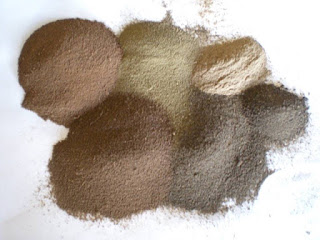
Across the country orchards have been grubbed up, and local varieties of apples have vanished. Although some of these varieties are preserved at Brogdale National Fruit Collection, the true way to preserve them is to encourage people to eat or drink the different varieties, and celebrate their flavours and characteristics. Once lost from our food culture, they become mere museum pieces; culinary curios.
Sadly it is increasingly difficult to sell unusual varieties through shops. "I can take Braeburns, Gala and Cox" is the usual reply.
We grow over 40 varieties of apple and pear trees. Most of these are unsaleable through greengrocers. Did you know each variety of apple has a pollination date, a picking date, and an eating date? Natural sugar levels rise after picking increasing the flavour and aroma.
New commercial orchards are planted up with apples that supermarkets know they can shift, leading to large single variety plantings. These monocultures are harder to control for pests and disease. They are also more vulnerable to extreme weather conditions than a diverse orchard. At the beginning of May 2011, we were in the grip of a drought that was affecting many of our trees. But not all of them. This is the key to one of our principles - to build diversity into our production so that we are less vulnerable to the extreme conditions that we are increasingly experiencing.
It also builds a diversity into our landscape, provides better habitat, and feeds the soul!
Please note we have scaled down our apple juice production. However, it is still available to purchase through Brockweir & Hewelsfield Village Shop and The Dean Forest Food Hub.
Our Approach to Soil Fertility and System Health ~ by Matt Dunwell
February 15th 2017 POSTED BY: Ragmans Farm
Ragmans Farm is a 60 acre organic farm
in the Forest of Dean in Gloucestershire. We use farming practices that
regenerate the land, using
permaculture as a guiding design principle. Between the three
main enterprises at the farm – Ragmans Lane Farm, the Willow Bank and Ragmans
Market Garden, we provide employment for about 8 people.
Ragmans Lane Farm has eight acres of
organic apples and we make our own brand of apple juice. We also host a series of courses throughout the year on land related
issues.
A course led by Jairo Restrepo in 2015 introduced us to a new philosophy of system health, based on building
healthy soils. This had a profound
effect on the farm, and led us to set up a full time research post to develop
these principles for temperate climate agriculture. Our research manager, Juanfran Lopez, is half way into a three year programme and this blog is predominantly about his
work here at Ragmans.
Our research goal is to gain expertise in making soil
amendment preparations. We will then measure the effectiveness of these
biological techniques on system biology and mineral balance on plant-soil
health and growth. Over the last twelve months we have put in place a series of
soil and plant tests and taken baseline data.
We are testing for pH, salinity, conductivity, a wide
range of trace elements and also available nitrogen. In addition to this, we
are developing a high quality range of preparations and techniques such as
biofertilisers, aerobic teas, mineral chelations, mychorriza, chromatography,
lactic acid bacteria, and native microorganism reproduction among other
methods….
The objective of this practice is to reproduce the local
microbiology, as bacteria, actinomycetes, fungi, algae and protozoa working in
a complete harmony in a healthy environmental system (forest, farm or even animal
and human system).
Whilst it is tempting to
try to produce a range of products for sale, we are wary of claims that certain
microbe mixes are ‘silver bullets’ to be used in the same way as chemical
fertilisers or herbicides.
We believe it is more important
to get a good understanding of the science behind this approach, and then for
farmers to tweak them into individual requirements or situations, thereby
having a positive impact on the farmer´s autonomy and viability and hopefully reaching
a broader scale.
An example of how we can work
through these preparations can be seen at Ragmans currently. We have in the past sampled our soils and
found them lacking in certain trace elements.
A conversation with any good soil lab will furnish you with the trace
elements needed, normally in the form of salts – magnesium sulphate etc. These
are supplied and put out onto the land with a spreader.
The addition of trace elements
in this way can be ineffective as both the soil and plant are looking for
elements in a bioactive form – ie easily digestible. For this reason sometimes
the addition of trace elements can be disruptive and almost always there is
waste.
When we make biofertiliser on
the farm we build a biologically active system using fresh cow manure that has
the gut flora and fauna of a ruminant. To this we add various ingredients –
including molasses, yeast, native microbes from the forest soil. A ferment takes place into which we can
place trace elements in minute quantities over a period of three or four
months. These minerals are cycled
through countless generations of microbes becoming more and more biologically
available.
When the preparation is ready
we spray onto the leaves and soil thereby feeding the system through the plants
that in turn will feed soil microbes with essential micro nutrients.
This is a basic example of our
approach as taught by Jairo Restrepo. We are only beginning to understand the
potential of natural agriculture, and there is very little knowledge at all of
this work in temperate systems.
We are also running a six day
course with Jairo at Ragmans from June 29
th to July 4
th 2017. Jairo's book 'The ABC of Organic Agriculture' is now available in English from our
on-line shop.
Back to main blog page
 Find us
Find us












